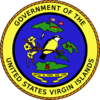U.S. Virgin Islands Constitutional Convention Question (2020)
| U.S. Virgin Islands Constitutional Convention Question | |
|---|---|
 | |
| Election date November 3, 2020 | |
| Topic Constitutional conventions | |
| Status | |
| Type State statute | Origin State legislature |
The U.S. Virgin Islands Constitutional Convention Question was on the ballot in the U.S. Virgin Islands as a legislatively referred statute on November 3, 2020. The ballot measure was approved.
A "yes" vote supported the Legislature enacting a bill to convene a constitutional convention to adopt the Revised Organic Act of the Virgin Islands (or a portion of the act) as the Constitution of the Virgin Islands. |
A "no" vote opposed the Legislature enacting a bill to convene a constitutional convention to adopt the Revised Organic Act of the Virgin Islands (or a portion of the act) as the Constitution of the Virgin Islands. |
Election results
|
Virgin Islands Constitutional Convention Question |
||||
|---|---|---|---|---|
| Result | Votes | Percentage | ||
| 7,275 | 71.92% | |||
| No | 2,840 | 28.08% | ||
-
- Results are officially certified.
- Source
Overview
The ballot measure asked voters whether the U.S. Virgin Islands Legislature should pass a bill to convene a constitutional convention for the purpose of adopting the Revised Organic Act of the Virgin Islands, or a portion of the ROAVI, as the U.S. Virgin Islands Constitution.[1]
As of 2020, the U.S. Virgin Islands did not have a territorial constitution. Instead, the Revised Organic Act of the Virgin Islands (ROAVI), a federal law passed in 1954, functioned as the territory's constitution.
In 1976, Congress passed a resolution that authorized the U.S. Virgin Islands to hold a constitutional convention to adopt a territorial constitution. The U.S. Virgin Islands has held five constitutional conventions, none of which have resulted in voters adopting a territorial constitution. In 1964, Congress did not approve the constitution. In 1971, the island government never submitted the proposal to Congress due to low voter support. In 1978, Congress approved a convention's proposed constitution but voters rejected the proposal. Likewise, in 1980, voters rejected a plan that received congressional approval.[2] In 2010, a constitutional convention forwarded a proposal to the federal government. Congress passed a resolution stating that there were several issues with the proposal and asking the convention to reconvene.[3] The convention reconvened but failed to pass a new proposal before the deadline.
Text of measure
Ballot question
The ballot question was as follows:[1][4]
| “ | Are you in favor of the Legislature enacting legislation to convene a constitutional convention to adopt the Revised Organic Act of the Virgin Islands, 68 Stat. 497 or a portion of it as the Constitution of the Virgin Islands?[5] | ” |
Full text
The full text of the ballot measure is available here.
Background
Status of the Virgin Islands
The United States purchased the Virgin Islands from Denmark in 1916, and the islands were transferred on March 31, 1917.
As of 2020, Revised Organic Act of the Virgin Islands (ROAVI) functioned as the territory's constitution. Congress passed the ROAVI in 1954 to replace an earlier version adopted in 1934.
Public Law 94-584
In 1976, Congress passed a resolution (Public Law 94-584) that authorized the U.S. Virgin Islands to hold a constitutional convention to adopt a territorial constitution. Public Law 94-584 provided specifics that the constitutions needed to meet:[6]
- The territorial Constitution must recognize, and be consistent with, the federal government's sovereignty over the U.S. Virgin Islands, the supremacy of the provisions of the U.S. Constitution, treaties, and laws of the United States, including provisions of the Revised Organic Act of the Virgin Islands that do not relate to local self-government
- The territorial Constitution must provide for a republican form of government, consisting of three branches: executive, legislative, and judicial
- The territorial Constitution must contain a bill of rights
- The territorial Constitution must deal with the subject matter of those provisions of the Revised Organic Act of the Virgin Islands of 1954 that relate to local self-government
- The territorial Constitution must provide for a system of local courts that is consistent with the provisions of the Revised Organic Act of the Virgin Islands
Public Law 94-584 provided that delegates to a constitutional convention needed to be U.S. citizens and qualified voters of the U.S. Virgin Islands. Under Public Law 94-584, conventions must present their proposed constitution to the governor, who must present the document to the president, who must transmit the constitution to Congress. Congress must approve or amend the constitution within 60 days or else the transmitted document is considered accepted. Thereafter, the U.S. Virgin Islands must hold a referendum on the proposed constitution.[6]
Path to the ballot
Bill 33-0292
The ballot measure was introduced into the Legislature of the Virgin Islands as Bill 33-0292 on January 14, 2019. On May 8, 2020, the legislation passed with unanimous support.[7] Gov. Albert Bryan (D) signed the bill on May 19, 2020.[8]
See also
|
Footnotes
- ↑ 1.0 1.1 Legislature of the U.S. Virgin Islands, "Bill 33-0292," May 19, 2020
- ↑ U.S. House Subcommittee on Insular Affairs, Oceans and Wildlife, "The Proposed Virgin Islands Constitution From the Fifth Constitutional Convention," March 17, 2010
- ↑ U.S. Congress, "Public Law 111-194," June 30, 2010
- ↑ Legislature of the U.S. Virgin Islands, "Bill 33-0339," July 27, 2020
- ↑ Note: This text is quoted verbatim from the original source. Any inconsistencies are attributable to the original source.
- ↑ 6.0 6.1 U.S. Code, "Public Law 94-584," October 21, 1976
- ↑ The St. John Source, "Voters Might Consider a Virgin Islands Constitution on November Ballot," May 15, 2020
- ↑ Legislature of the U.S. Virgin Islands, "Bill 33-0292 Overview," accessed August 18, 2020
| ||||||||||||||||||||





